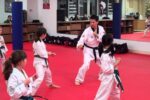The principles of TAEKWONDO, as they are traditionally known, are 5: Courtesy, Integrity, Perseverance, Self-Control and Indomitable Spirit. These represent
5 virtuous attitudes that Taekwondo practitioners must demonstrate at every moment.
COURTESY
Courtesy is more than a principle of Taekwondo, it is a principle of life, which must always be present in the practitioner’s relations with others.
Being courteous means respecting others, being modest, human and delicate, and showing interest in the well-being of others.
Courtesy is often present if, when we do something, we worry about not harming others with that action.
This type of behavior must exist not only in the practitioner relationships – Sambo Nim, but also in the relationship with all those with whom the
practitioner relates, directly or indirectly.
Increasingly rare in modern social relationships, courtesy must be evident in everyone’s daily attitude. The growing self-centeredness of the modern citizen
has been compromising the survival of this very valuable principle …
INTEGRITY
Integrity consists in doing, on a daily basis, what is right from a social perspective, never harming others with our actions.
It is necessary for the practitioner to behave with responsibility and a sense of justice, maintaining a constant and severe sense of self-criticism, to
analyze their actions, verifying their correctness within the group in which they belong.
Only when the practitioner knows himself, pointing out his defects without fear, will he be able to overcome himself and get to know others. In this way, you
will be able to act with integrity within the group you belong to.
Integrity is mirrored daily in the relationship with those around us. Knowing how to live in society and knowing how to act correctly within a group is a
quality that develops primarily in Taekwondo classes.
PERSEVERANCE
The practitioner must, at all times, be able to say “I will achieve more”, overcoming his limitations and difficulties.
You should never give up in the face of obstacles, facing each difficulty as a new opportunity to give the best that is in you. Only in this way will you be
able to evolve.
As it is an Olympic sport, we must defend in Taekwondo the maxim of the Olympic Games: “Faster, Higher and Stronger” (faster, taller and stronger).
The difficulties that modern life, in society, imposes on us, make the quality of perseverance decisive. Only with this can you overcome the barriers and
obstacles that must be overcome to achieve personal success.
SELF-DOMAIN
The ability to execute a technique is closely linked to the ability to control it.
The Taekwondo practitioner is trained to react, at any time, with high levels of efficiency and effectiveness. However, you must be able to control this
reaction whenever necessary.
In addition to the physical, you should also be able to control your emotions and feelings, acting at all times in a modest, humble and sincere way.
With training you develop the ability to control emotions and to have the right attitude at every moment, despite sometimes “feeling” doing something
different.
INDOMABLE SPIRIT
The practitioner must develop his spirit as a weapon, able to motivate him in the pursuit of his goals.
A person with a strong spirit must, under any circumstances, maintain the chosen path without hesitation and without fear, fighting to the end for the
principles that guide his life.
Nothing can beat a Taekwondo practitioner with a determined spirit to win. However, you should always make the right choices, not using this ability to harm
others.
Principles of Philosophical Guidance
The Taekwondo practitioner must seek to have a fair and dignified performance throughout his life and in all his relationships with other people.
It should above all:
… observe the principles of Taekwondo and its correct use in your daily life;
… respect everyone, in the same way that you want everyone to respect you;
… never use your knowledge of Taekwondo unnecessarily or with bad intentions;
… be a champion in the defense of freedom and justice;
… do to others only what you don’t mind being done to you;
… be fair to others the way you want others to be fair to you;
… help whenever you can, in the way you like to be helped;
… train with the desire to do better, not giving up before the limitations of the body;
… challenge your physical and mental limits to become a more complete human being;
… feel each step of the training process and internalize the physical and mental changes it causes;
… understand each gesture, movement or attitude, as a way to understand what training can benefit you;
… to contribute, in the best possible way, to a better and more peaceful world.
The information contained in this page (texts and images) is a reproduction of the work “Forming Practitioners of Taekwondo”, with the respective
authorization of the authors.





[…] PRINCIPLES […]